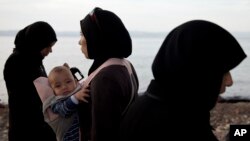European countries, the United States and rich Persian Gulf nations are coming under criticism from human rights groups for not doing enough to help with the Middle East migrant crisis.
East European countries have been reluctant to grant refugee status in significant numbers to those fleeing persecution and conflict and allow them to resettle in those countries. Gulf countries are accepting only migrant workers, but leaving open the option of deporting them at any time.
In an interview with VOA’s Russian Service, Kenneth Roth, executive director of the U.S.-based Human Rights Watch, said that the newer members of the European Union have displayed a historic phobia when it comes to accepting Muslim refugees from the conflict-ridden Middle East.
Roth said that Eastern European countries should share not just the benefits, but also the responsibilities of being part of the union, namely, to share the legal obligation of accepting people seeking asylum.
“There is a real need to stand up against that Islamophobia. It is based on this false conception of European history that there is such thing as ethnic purity," he said.
"Every European country is a product of migration and population flows. Yes, Europe has been predominantly Christian, but countries have been able to integrate Muslims, and those who have not, have frankly been faulty of their social welfare policy,” Roth said.
It has been a fact that they have permitted discrimination to keep these populations socially marginalized, Roth said, rather than “enabling them to come to the mainstream of economic fulfillment and political participation.”
Political marginalization
Roth also said that the current refugee crisis is not a crisis in terms of numbers — they represent only one tenth of one percent of the European Union’s population and the countries can easily absorb them — but it is a political crisis because of Islamophobia and political considerations.
No Syrian refugees have been formally resettled in Persian Gulf states like Kuwait, Bahrain and the United Arab Emirates, although Gulf officials say some Syrians have entered on visitor visas and just stayed on.
Rights groups point out that those who have been allowed to remain come from wealthy and powerful families. Roth also criticized Saudi Arabia and other Persian Gulf countries for not taking any refugees.
“Would some of them prefer Saudi Arabia and UAE, if it were clear the resettling there were a possibility, we do not know the answer to that. But given that a significant number of Syrians do work in the region, I think that we would anticipate that some refugees would resettle there," he said.
"That option is not being given to them. Some of them, if they can get a job, they are allowed to go in, but if you show up on the door like a refugee, the Europeans say, ‘yes,’ we recognize your right to apply for asylum, if you are fleeing persecution and conflict we will allow you to resettle in our countries. The Gulf states do not abide by those rules.”
The Saudi foreign ministry challenged such criticism in a statement released late Friday. The ministry said Saudi Arabia has been one of the largest providers of aid to Syria's people, and has taken in around 2.5 million Syrians since the beginning of the conflict.
"In order to ensure their dignity and safety, the kingdom adopted the policy not to treat them as refugees or place them in refugee camps. They have been given the freedom to move about the country, and those who wish to remain in Saudi Arabia (some hundreds of thousands) have been given legal residency status like the remaining residents," the statement said.
It said total Saudi aid to the Syrians, both in the kingdom and in other countries, has totaled about $700 million.
Roth was also critical of the United States for not doing enough in terms of refugee quotas and called the U.S. commitment “a pittance.” As a vast and rich country, he said, the U.S. should be doing more to help in addressing the current crisis.
Besides Human Rights Watch, other organizations have intensified their humanitarian activities in response to the crisis, especially after the photo of a little boy found dead on a beach went viral on social media.
The Syrian American Council, or SAC, is calling for U.S. congressional support to aid the Syrian refugees and accept significantly more than the 1,500 refugees that the U.S. has received already. The number needs to be dramatically expanded, SAC said in a statement on its website.
The International Rescue Committee, or IRC, voiced dismay at President Barack Obama’s announcement this week that the U.S. government would increase by just 2,000 the number of Syrian refugees to be admitted to the United States in 2016 – from 8,000 to 10,000.
In a statement posted Friday on its website, the IRC said it is supporting Refugee Council USA in its call for the U.S. to resettle 100,000 refugees next year.
Syria’s nearly five-year civil war has claimed more than 250,000 lives and forced nearly 5 million Syrians out of their home country.
VOA's Russian Service contributed to this report.













